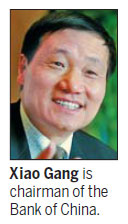
Leading financier seeks better services for companies overseas

One of the country's leading bankers has called on financial institutions to boost support for domestic companies expanding overseas.
"There are greater opportunities for expansion as the currency undergoes rapid internationalization," Xiao Gang, chairman of the Bank of China, told China Daily in an exclusive interview.
"That requires commercial banks to provide more credible and convenient services overseas to satisfy client demand."
The financial sector should rapidly embrace internationalization, as it lags behind industrial companies, Xiao said in Yokohama, Japan, during the two-day China-Japan Entrepreneurs Exchange Meeting of the Boao Forum for Asia, which ended on Friday.
China's global investment hit $437.3 billion and was spread across 178 countries and regions by the end of last year.
Zhang Jianping, a researcher from the Institute for International Economic Research affiliated to the National Development and Reform Commission, said last week that the pace of investment will continue to accelerate due to swelling foreign reserves and the expanding outreach of companies.
The first five months of the year saw investment overseas increase by 40.2 percent year-on-year to $28.52 billion, according to the Ministry of Commerce.
Xiao said yuan-denominated settlement in cross-border trade has reduced foreign exchange risks for Chinese companies and accelerated their development in foreign markets.
The yuan's internationalization means Chinese companies and banks have a choice to select their settlement and investment currency, making it easier to lower financing costs.
"Choosing growth areas is vital to the success of bank internationalization. As China's trade and investment with the rest of the world is increasingly diverse, banks must further expand their global networks," Xiao wrote earlier in a commentary on China Daily.
Major Chinese lenders are focusing on the global market.
The three years up to the end of 2011 saw overseas assets of the Big Four banks - Industrial & Commercial Bank of China Ltd, China Construction Bank Corp, Bank of China, and Agricultural Bank of China Ltd - grow from 2.41 trillion yuan ($377 billion) to 4.13 trillion yuan. Their overseas offices and branches increased to more than 1,200 from 959 in the same period.
In addition to enhancing their presence in Western countries, Chinese banks should attach more importance to delivering financial services in Asia, Africa, the Middle East and Latin America, Xiao said.
Currently, the century-old Bank of China has the widest global presence of China's banks, with more than 590 branches, offices and outlets in 32 countries and regions.
Overseas assets and post-tax profits accounted for 23 percent of its profits in the first quarter of this year.
The government has introduced policies to encourage and guide overseas investment by private firms, including allowing major companies to issue yuan and foreign currency bonds and expanding the use of yuan in overseas investments.
The government will also encourage banks to provide loans for exports as well as mergers and acquisitions and offer project financing with pledges of overseas stock rights and assets.
"The government can give support in terms of policies and insurance to avoid unexpected political, financial, and legal risks when Chinese firms expand their businesses in foreign countries," Xiao said.
"What the commercial banks can do is to prop up the global strategy of companies by broadening services from basic financing to professional and comprehensive consulting."
But capital controls must be eased to enable the banks to pursue their global strategy, he said.
On June 29, the National Development and Reform Commission introduced financial reform, on a pilot basis, in the Qianhai Bay development zone in Shenzhen. The policies include trials for capital convertibility.
Yuan and Japanese yen can be directly converted since June 1, breaking the tie with the US dollar, which was a "milestone" in the yuan's internationalization process, said Xiao.
So far, transactions between the two currencies are "smooth and sound", with an average daily volume of about 30 billion yen ($376.5 million), he said.
"It has the potential to grow faster in the near future," the banker said. "It can facilitate the economic integration in Asia and improve financial cooperation in the region."
As the European debt crisis showed no signs of easing, many banks there have seen huge pressure on their balance sheets. Some of them have sold or plan to sell assets to supplement cash, which provides opportunity for Chinese commercial banks according to the chairman.
But Xiao cautioned earlier that the key issue in "organic growth" is to identify the fact that the rationale of merger and acquisition activity must be in line with global strategy.
chenjia1@chinadaily.com.cn


 Washington to remain focused on Asia-Pacific
Washington to remain focused on Asia-Pacific RQFII target blue chips amid bear market
RQFII target blue chips amid bear market Australian recall for top two exporters
Australian recall for top two exporters China fears new car restrictions
China fears new car restrictions